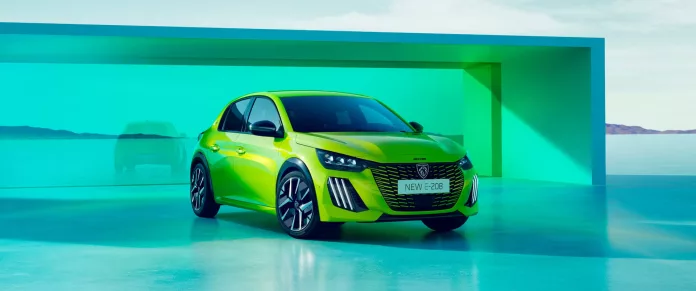With over 202,000 plugin vehicle registrations in February, Europe marked a 10% growth from the previous year, matching the overall auto market’s expansion rate. However, EV market share saw no significant change, maintaining a 20% foothold with full electric vehicles (BEVs) accounting for 13%.
Electric and Hybrid Vehicle Growth
Both battery electric vehicles (BEVs) and plug-in hybrids (PHEVs) exhibited comparable growth patterns, with BEVs seeing a slight 10% increase and PHEVs following closely at 9%. Due to the discontinuation of incentives in key markets like Germany and the anticipation of new EV models, the BEV segment is currently in a state of flux. Comprehensive growth is expected in the latter half of the year as fresh offerings hit the roads.
Contrastingly, non-plugin hybrids are surging, witnessing a 24% YoY growth and claiming a 29% share of the market in February. Electrified vehicles now represent half of the European car market. Diesel’s decline is evident, now only pulling 12% of the market compared to its previous dominance of above 50%. Projections suggest diesel may become obsolete in the European passenger car segment by 2027.
Leading Models in February’s EV Sales
The Tesla Model Y continues to dominate as Europe’s top-selling EV, registering 19,946 units in February. Despite its success, it may be nearing its peak performance in Europe, with the refreshed Tesla Model 3 potentially impacting its sales. The Tesla Model 3 itself stands firm at second place with 8,120 registrations, its demand buoyed by a recent update.
Ascending to third position, the Peugeot e-208 accumulated 5,319 registrations, reflecting a resurgence in sales after overcoming production constraints. Its success was largely due to a concentrated push in the French market.
The Volvo XC40, including both BEV and PHEV versions, maintains its position in the top five with 5,034 sales. It’s noteworthy that its sales have not been significantly affected by its newer and more affordable sibling, the Volvo EX30.
Making its mark, the MG4 claims the fifth spot with 4,990 registrations, highlighting its position as a competitive and well-designed electric hatchback option for Europe.
Surprises and Predictions
Volvo’s EX30 and the Porsche Cayenne PHEV celebrated record performances, signposting potential for increasing standings in the EV market.
Looking at the 2023 rankings, Tesla’s Model Y holds a substantial lead over the Model 3. The Volvo XC40 is up to third, and the Peugeot e-208 has impressively climbed five spots to sixth. Mercedes GLC PHEV and the new BMW iX1 are also ones to watch, with their recent rises in the rankings.
Brand and Group Standings
In the brand rankings for plugins, Tesla leads the pack with an 11.6% share. BMW follows as runner-up, while Mercedes, Volvo, and Audi occupy the next positions. Interestingly, premium brands dominate the top 5 rankings, with Volkswagen – the highest-ranking mainstream brand – placing sixth.
On the group level, Volkswagen Group retains its lead despite a slight dip in market share, followed by Stellantis and Tesla. Geely-Volvo is on the rise, challenging other automakers like BMW Group and Mercedes-Benz Group for higher spots in the market rankings.
All in all, Europe’s EV market is showing signs of sustained growth and diversity, with premium and mainstream brands alike jostling for dominance in this rapidly evolving landscape.
























